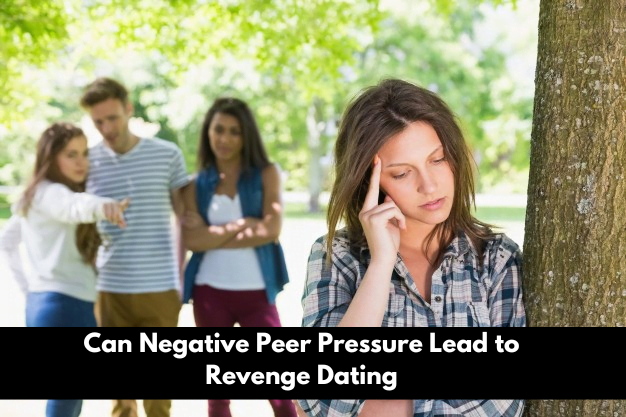Can Negative Peer Pressure Lead to Revenge Dating?

When it comes to modern dating systems, the influence of peer pressure isn’t limited to just high school hallways; it reaches far beyond, impacting choices and decisions in ways we may not even realize.
It can shape relationships and lead to surprising patterns, even as harmless compromises start affecting our well-being. For example, the trend of revenge dating shows how emotional pain and social pressures can guide people into unhealthy behaviors as a response to feeling pressured.
Young people today are often caught in these dynamics where peer pressure feels like a force that pushes them into specific actions, and it’s crucial for ourselves to understand how to recognize it.
Through practical tips and self-awareness, we can learn to make choices that reflect what we truly want rather than what others might expect, helping us steer clear of negative patterns that don’t align with our authentic selves.
What is Negative Peer Pressure?
Peer pressure is a nearly universal experience that can leave people feeling swayed by the group around them. Whether it’s joining an activity that doesn’t thrill us or dressing a certain way to fit in, the influence of others is hard to escape. Negative peer pressure, though, takes this influence in a different direction, sometimes pushing individuals into behaviors that don’t align with their own values or goals.
It can even lead to choices like revenge dating after a breakup, as someone tries to prove something to a friend or others in their social circle. What might seem like encouragement can actually be rooted in resentment or insecurity, leading to unhealthy patterns that don’t reflect one’s true desires.
When negative peer pressure is at play, its powerful influence often works to steer individuals into conflict with their own values and goals. Through persuasion, teasing, or even bullying, it creates subtle cues that pressure people to conform to the standards of a group. These standards can sometimes clash with one’s personal boundaries or lead to risky and even harmful behaviors.
According to Dr. Albert Bandura, a well-known psychologist who studied social dynamics, peer pressure can make someone feel pressured to override their own judgment. This external force can bring up strong emotions like anger or a desire for revenge, leading to actions such as revenge dating that serve as a response or resistance to feeling controlled.
- Criticism or Mockery: Friends may ridicule someone for being single or for struggling post-breakup.
- Encouragement of Rebound Relationships: People might urge someone to “get back out there” or “show them what they’re missing.”
- Perpetuating Social Norms: There’s a notion that moving on quickly means you’re “strong,” while mourning a relationship is seen as weakness.
What is Revenge Dating?
Revenge dating is a term used to describe dating or engaging in new relationships to make a former partner jealous, prove that one has “moved on,” or simply cope with hurt feelings after a breakup. Often, it involves:
- Starting new relationships quickly after a breakup to showcase that one is “doing fine.”
- Seeking validation from new partners as a means to feel desired.
- Hoping to make the ex-partner jealous or regret their decision to end the relationship.
While it might initially provide some emotional relief, revenge dating often leads to a cycle of regret, confusion, and sometimes even more heartbreak.
How Negative Peer Pressure Can Lead to Revenge Dating
There are several ways in which negative peer pressure can push individuals toward revenge dating:
1. Pressure to Move On Quickly
After the relationship ended, well-meaning companions regularly recommended engaging with others promptly to “forget” intimate bonds now severed. Expressions like “you must advance” or “come across somebody preferable” can foster an air of immediacy in supplanting a past partner.
This hastily conjured demand can lead persons to think if new connections are not located without delay, they are frail or insufficient. Alternatively, gently accepting solitary season and selectively reconnecting with erstwhile interests affords vulnerable souls respite and ease in reestablishing confidence on their own compatible terms.
2. Comparisons with Others
While seeing companions in relationships or gladly progressing can regularly stir sentiments of shortcoming, singleness has its own particular rewards. Close to home gatherings now and then heavily recommend that one ought not stay solitary for long after a separation, yet expelling oneself from this pressure can clear a method for self-disclosure.
Some may attempt to remedy their separated status in a rush to look like their peers, however genuinely discovering oneself is a superior initial step than accepting a new individual just to keep up appearances. A time of reflection can bring more enthusiastic clarity than quickly filling the space left by another.
3. Fear of Judgment or Ridicule
Friends who fail to recognize how profoundly another’s heartache can affect them often encourage rushing past emotional wounds before they’ve knit.
Queries such as “Are they still occupying your thoughts?” or “Why does their memory linger?” risk making a person feel silly for requiring patience in mending. To circumvent the potential for mockery, some folks plunge headlong into rebounding romances to feign being unfazed.
4. Seeking Validation and Approval
In a world where social media has infiltrated daily life, individuals frequently yearn for validation from acquaintances. Newly single people, stung by past relationships, sometimes retaliate by eagerly exhibiting their latest intimate connections on platforms visible to former partners.
Meanwhile, “friends” cheer on such behavior with careless comments encouraging ostentation. However, crafting an exaggerated online persona as a means to soothe injured pride or inflame past hurts often backfires in the long run. While initially feeling vindicated receiving fleeting praise from peers on displays designed to wound, eventual loneliness still finds those not truly moved on.
The Emotional Consequences of Revenge Dating
While revenge dating may seem satisfying initially, the emotional repercussions can be challenging. Here are some of the common consequences:
1. Lack of Genuine Connection
While revenge may seem appealing in the wake of failed relationships, dating without genuine care or concern for another will likely breed further discontent. Those who rush carelessly into the comfort of new affections before resolving past hurts risk finding temporary solace that proves superficial and hollow. Old wounds left to fester can undermine connections sought solely for selfish ends rather than mutual understanding.
2. Potential for More Heartbreak
Wiser by far to slowly mend what has been broken within ourselves before reaching out half-heartedly to another. Only through reflection and growth may we offer companionship of true and lasting value; by emerging strong yet softened from sorrow’s refining fire with empathy, patience and care enough to see beyond surface into essence, to love not in spite but in honesty of spirit. This way lies healing that does not re-injure – for self or other – in its wake.
3. Loss of Self-Respect
While vindictive dating may seem like a cathartic choice in the aftermath of heartbreak, it often breeds behaviors antithetical to one’s character. Compromising core principles or bypassing intuition leaves self-worth tattered, lengthening recovery.
4. Strained Friendships
While pals may initially champion getting even, should the retaliatory romance go awry they risk belittling a decision borne of anguish. Second-guessing sows new seeds of strife in soil already salted with sorrow, compounding inner tumult. Though the solace of sweet revenge appears easy pickings, wisdom knows such fruit but nourishes future fret.
5. Dependency on Validation from Others
While revenge dating may seem like a cathartic way to recover from heartbreak in the short term, basing one’s self-worth on another’s superficial validation is a precarious path that rarely leads to genuine fulfillment.
This dependence leaves one’s sense of identity vulnerable to external forces beyond one’s control, ensuring that inner peace will remain a transient state. A much surer route to resilience is through cultivating compassion for oneself by appreciating one’s inherent lovability regardless of another’s fleeting affection.
How to Resist Negative Peer Pressure Post-Breakup
If you find yourself being pushed toward revenge dating by friends, consider these strategies to maintain emotional integrity:
1. Communicate Your Boundaries
Be open with friends regarding your necessity to heal by your own provisions. Allow them to know that while their aid is valued, you are not searching to hastily engage in a new bond.
2. Focus on Self-Reflection
Subsequent to a split up, expend time contemplating what you want from upcoming relationships. Individual introspection permits you to process your emotions and gain from prior encounters instead of promptly jumping into something novel out of bitterness or unhappiness.
3. Avoid Using Social Media as a Coping Mechanism
It’s enticing to show off newfound liberty or fresh romantic interests online, yet recollect that this can often backfire. Rather, employ social media judiciously and refrain from vengeance posting that could harm you in the long run.
Moreover, careful consideration about past relationships and future goals will serve you well during this transitory time. Though the path is hard, focus on personal growth will reward you with peace and clarity.
4. Seek Supportive Outlets
Reflecting on productive ways to handle feelings proved wise, whether journaling freely, seeking counseling, or immerse in hobbies of joy’s renewal. A therapist’s neutral ear and guidance can ease the processing of complex emotions, without the demand to swiftly leave turmoil behind.
5. Be Mindful of Your Motivations
Questioning the motivations for entering a new romance offered insight. If retaliation against an ex or displaying new ties to acquaintances drives the desire, full healing may not transpire. Pursue fresh relationships only when prepared in spirit to make oneself openly accessible once more, without lingering shadows of the past.
Conclusion
Negative peer influence can undoubtedly guide individuals into retaliation relationships, propelling them into connections that may not serve their best interests. While companions and family regularly intend well, it’s pivotal to tune in to your own prerequisites and sentiments instead of yielding to outside weights.
Retaliation relationships may offer fleeting fulfillment yet regularly the plausible sentimental expenses exceed the advantages. Rather than that, center around recuperating and developing from past encounters, permitting you to hopefully meet future associations with a sound way of thinking and a clear soul.
The recollections of past disappointments still sting, but looking ahead allows the pain to fade. Though friends advocate for swift romance, slow healing serves us best. Within lies wisdom greater than any crowd could offer.
Read More Content on: Veryhealthline.com


